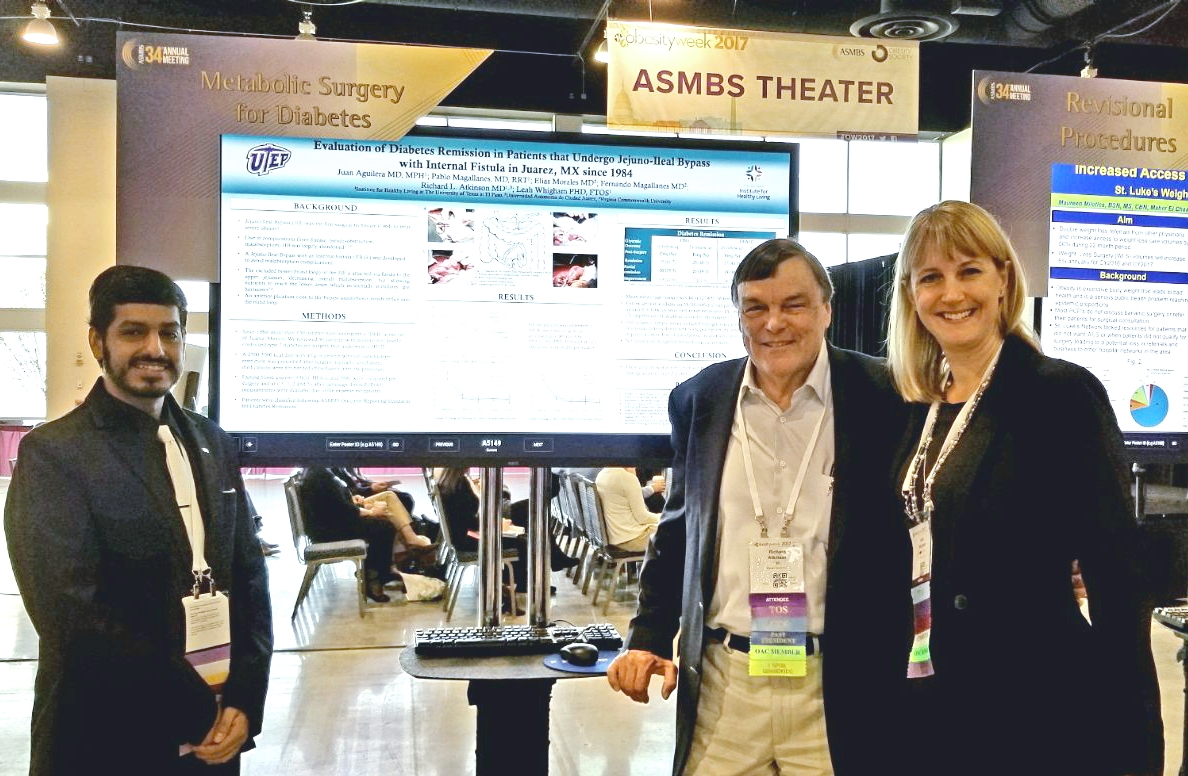UTEP Students Present Research at Obesity Conference
Last Updated on December 01, 2017 at 2:15 PM
Originally published December 01, 2017
By University Communications
UTEP Communications
Four students who work with the Institute for Healthy Living (IHL) at The University of Texas at El Paso presented research projects in Washington, D.C.at ObesityWeek, the largest obesity-focused conference in the world.

Juan Aguilera, M.D., is a student in UTEP’s Interdisciplinary Health Sciences Ph.D. program. He presented a poster titled, “Evaluation of Diabetes Remission in Patients that Undergo Jejuno-Ileal Bypass with Internal Fistula in Juarez, MX.” This study is a collaboration with another IHL student, Pablo Magallanes, M.D., who is in the Master of Public Health program at UTEP. Other collaborators on the project include a metabolic surgery group from Mexico, and Richard Atkinson, M.D., a member of the IHL's Scientific Advisory Board and a prominent national obesity expert.
"This is a great step toward publishing the full results of the project that sparked my interest in research," Aguilera said. The results show that diabetic patients undergoing this procedure have improved outcomes related to diabetes, and about 40 percent of them have diabetes remission.
Cassandra Urrutia is a recent graduate of the Master of Public Health program at UTEP who works at the IHL as a research associate. Urrutia presented research from her master’s thesis work in a poster titled, “Nutrition Education Program Targeting Home-Based Child Care Centers in Doña Ana County, New Mexico.” Her poster summarized findings from a recent study she worked on in collaboration with the Community Action Agency of Southern New Mexico. The study evaluated the effectiveness of the Healthy Opportunities for Physical Activity and Nutrition Home Program (HOP’N Home) to develop preschool-aged children’s asking skills for healthy environmental change in their home (i.e. asking for more fruits and vegetables and physical activity). Results of the study showed that there was a significant increase in the number of times children asked for vegetables from pre to post study and significant decrease in time spent watching TV and movies.
“Since children often lack major decision-making power within the home, oftentimes they don’t feel like they are able to influence their immediate surroundings,” Urrutia said. “It was interesting to see how some of these participants developed their own voice throughout the program.” The project was funded by the Paso del Norte Health Foundation.
Patrick Hopkins is a student in the Interdisciplinary Health Sciences Ph.D. program and works as a graduate research assistant for the IHL. He recently completed his Master of Public Health at UTEP and presented those results at ObesityWeek. His poster, titled “Evaluating the Impact of a High School Garden in El Paso, Texas for Fruit and Vegetable Intake Using a Valid Biomarker,” summarized results of an evaluation project conducted at Bowie High School in El Paso. The novelty of this study was the use of reflectance spectroscopy, also known as the Veggie Meter, as a non-invasive and reliable biomarker for assessing change in fruit and vegetable intake over time.
“This study showed the importance of using behavior change theory in curriculum design for school-based approaches to increase fruit and vegetable intake,” Hopkins said. “Without such a curriculum, exposure to fruits and vegetables in a school garden is unlikely to impact intake.” This research was funded by the Paso del Norte Health Foundation.
Karen Del Rio, a health promotion major and research assistant at UTEP, presented a poster titled, “Prevalence of Obesity and Risk Factors for Metabolic Syndrome among Uninsured College Hispanic Students in El Paso, Texas.” This study is a collaboration with Juan Aguilera, Ph.D., from the Interdisciplinary Health Sciences Ph.D. program, and Joao Ferreira-Pinto, Ph.D., associate professor and director for research and special projects with the Center for Interdisciplinary Health Research and Evaluation at UTEP. Their study looked at risk factors for metabolic syndrome in uninsured college students at UTEP and found that while there was a low prevalence of metabolic syndrome (10 percent), 60 percent of students had at least one metabolic abnormality and 23 percent had two or more.
“Early detection of metabolic risk factors is crucial for disease prevention, and college campuses provide a distinctive setting for targeted program development and risk factor detection,” Del Rio said. This research was funded by the City of El Paso.
Leah Whigham, Ph.D., executive director of the IHL, and Alisha Redelfs, Ph.D., deputy director for research and evaluation, mentored the UTEP students on their projects.
Whigham also chaired a session at the conference titled “Addressing Obesity Through Charitable Food: The Food Pantry as Laboratory for Healthy Eating Research,” which highlighted work being done in the Paso del Norte region in partnership with the Kelly Memorial Food Pantry with funding from the Paso del Norte Health Foundation. Rather than just providing emergency food assistance at the food pantry, this project addresses the root causes of hunger. Participants in the program were successful in improving their health and nutrition, obtaining employment, improving their housing situation, and obtaining health insurance.
“It is exciting to see that this innovative work being done here in our region is receiving national attention,” Whigham said.
For more information, visit www.pdnihl.org.